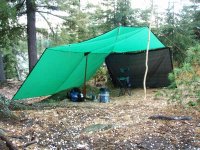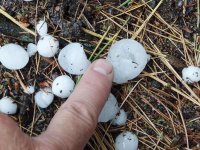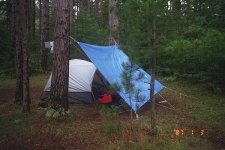Hi,
Last September, I embarked on a 9-day solo trip to Algonquin's northern section. I thought myself well prepared until the weather turned fouled for a few days in a row. While lying in the tent waiting out the rain storms I came to the realization that I could really use a weather radio.
I am curious to know what fellow trippers carry with them in terms of weather radio, the model, and if it is one of those hand winding ones or battery operated.
Shan
Last September, I embarked on a 9-day solo trip to Algonquin's northern section. I thought myself well prepared until the weather turned fouled for a few days in a row. While lying in the tent waiting out the rain storms I came to the realization that I could really use a weather radio.
I am curious to know what fellow trippers carry with them in terms of weather radio, the model, and if it is one of those hand winding ones or battery operated.
Shan



